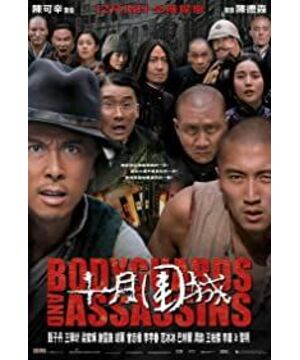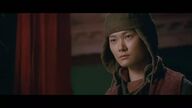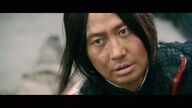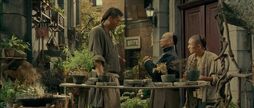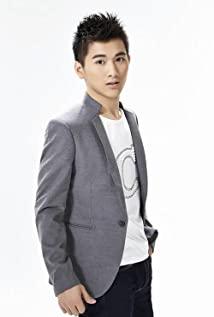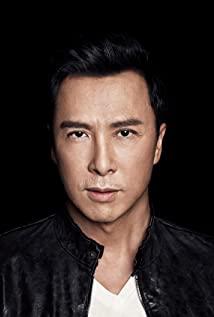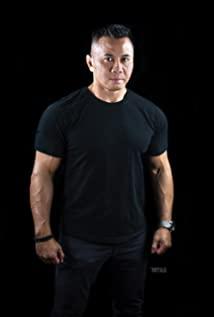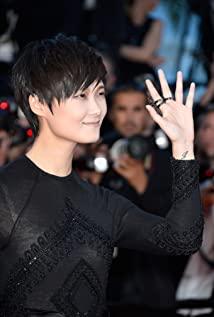, "October Besieged City" became a hit, and the box office in the mainland exceeded 200 million. Continue to comment or say "the plot setting is unreasonable", or say "excellent but not excellent". Some intellectual friends around me also have criticisms, such as being too blunt, too coincidental, and so on.
Chen Kexin himself said that "October Siege" is a "silly movie". I think he's telling the truth, I've only seen the word "trust" in the whole movie, no matter what that trust is built for. So I keep stressing that it is the perfect "commercial film". Most of the characters' actions are not lacking in impetus, and the plot is closely linked, and there is no blood in the emotional part to attract laughter, which is enough for commercial films. Commercial films are not literary and realistic films, they don’t have to follow the logic of reality, they still want intense dramatic conflicts. Compared with "Wheat Field" which thinks too much and "Three Guns" which thinks too little, "October Siege" is enough to be called a model of Chinese commercial films.
It is very stupid and naive. The principals on both sides have no self-interest considerations. They are all national and national. The supporting actors' emphasis on friendship over life and death is a beautiful imagination of the public. Therefore, "October Besieged" is a dream in this winter's cold wind. It presents this lovely and unbelievable pseudo-history to arouse the audience's righteous indignation and grief. The so-called Sun Yat-sen, the so-called anti-Qing great cause, might as well be regarded as a symbol. , can be replaced by any great man, the big goal of any era, without any loss of this silly story - this is the interpretation from the perspective of intellectuals, which has nothing to do with business and box office, and is misplaced and invalid for a commercial film facing the public. .
Qualified commercial films are all silly films, but they are not as arrogant as "Three Guns". They live to kill any possibility of thinking. They only stretch out their arms and scratch their arms and ask for laughter. They only bow their heads humbly and use their sense of experience. Powerful images and details, quietly persuading: let go of your mind, cry and laugh with us, create a 90-minute dream with us, just like the artificial darkness around here, avoid and forget the dazzling sunlight outside, ordinary life.
Moreover, there is still a difference between a good commercial film and a qualified commercial film. The difference lies in whether it can provide a gap to think deeper and wider. As Chen Kexin said, "2012" is a stupider movie than "October Siege". It does not provide any ideological gaps, forcibly forces the audience to accept its ethical arrangements (it can also be said to forcibly cater to the mainstream mentality of the audience), children do not die, pets do not die, rescue always comes at the last minute, and it seems to pay attention to individuals in disasters , but routinely used a lucky family to cover the cruelty of the disaster, the survivors with names replaced hundreds of millions of unnamed martyrs, and the disasters of the world made an ark cheer and save Anxiety of the audience dragged into the video situation by special effects.
By contrast, "October Siege" provides such a gap. Even if it was the second time watching the movie, when Ah Chun read the young master's favorite "London Suffering" for Ah Si, Zhang Hanyu's somewhat too sweet voice sounded simultaneously: the pain of subjugation for 260 years, the autocracy for more than 2000 years The calamity... The revolution is to make people not feel hungry or cold... The camera slowly pans to the mediocre and peaceful people in the market, working, wandering, laughing, resting, and intentionally or unintentionally expressing the righteousness in the voice-over Constitutes a light irony. At that moment, Lu Xun borrowed the words of a Russian, Alzhibasifu, and sent a sharp question that came unexpectedly and roared:
"You have reserved the appearance of the golden age to the descendants of these people, but what is there? For these people themselves?"
This is no longer the atmosphere of watching commercial films. This voice is elusive, accompanied by blood, cowardice, danger and fear, escorting all the way to the last shot of the film. Dr. Sun Yat-sen has already embarked on the ship returning to Japan. The camera slowly rolled down from his helmet-shaped cap, and it was frozen. It was no longer the confident and full face when he preached righteousness just now, with bright tears filling his eyecups.
These tears were directed to Sun Wen, indicating his awareness and intolerance of individual sacrifice. However, after all, the ship has set sail, and the situation is imminent. The sacrifice of hundreds of people has exchanged for the tears of the great man. Is it the luck or misfortune of Weicheng? Some film critics said that "October Siege" violated the traditional values of Hong Kong films. In fact, it did not. In this colonial city, uprisings and anti-Mandu have nothing to do with it. As soon as Sun Wen left, the streets were still peaceful, and it was still abandoned outside the home country. It is the residence of the revolution, and ultimately the outcast of the revolution.
This is a purely personal feeling. Few viewers think of the Chinese characters in the revolutionary history from this film like me. At the turn of the eighteenth and nineteenth centuries, foreign and colonial Chinese had almost no intellectual elites. They had no guarantee of work and residence, and were almost unable to engage in any work with intellectual content. The price of their hard work and hard work, but a large part of the return to their hometown Tangshan, Kang Youwei came to protect the emperor, they donated money, Sun Yat-sen came to the revolution, and they also donated money, because they hoped that the motherland would be strong enough to shelter her displaced overseas citizens. Yet whether the revolution was successful or not, they were always the first to be forgotten.
Sun Yat-sen's tears were a small counter-attack. Those who were impassioned and those who sacrificed their lives for righteousness suddenly became suspicious and false in the tears. Reason tells me that this is probably my over-interpretation, but I prefer to believe that this is a hidden non-commercial element placed by the director. This element has a name called "feelings", otherwise they can completely let Sun Wen face the scorching sun on the Pacific Ocean and embark on his way home in high spirits.
I just skipped the 60 minutes of endless fighting between that voice and this picture, with only one point-of-the-point motto: "If you want the happiness of civilization, you must first go through the pain of civilization"—you
think Those law enforcement officers who use regulations to encourage "fishing", those decision makers who use regulations to approve "forcible demolition", and those who call self-immolation "violent resistance to the law", are they just driven out by self-interest and only tempted by political achievements? I don't believe that they must have found a legitimate explanation consciously for being so arrogant and brazen. Maybe it means "giving up a small family and caring for everyone", maybe it means "the collective interests are higher than the individual", maybe it is "If you want the happiness of civilization, you must first go through the pain of civilization."
Lu Xun's questioning came roaring again. This is a question that the founding father could not answer: "Civilization" means that everyone is not hungry, not cold, and has permanent production? Doesn't "civilization" include equal dignity for all, multiple choices, and freedom from fear? If the "sufferings of civilization" include the inability to choose to drive people to martyrdom for a great goal under a veil of ignorance, will it eventually overwhelm "civilization" itself?
Sun Wen's tears stayed in Hong Kong in 1906. I closed my eyes, but what I saw was China today.
View more about Bodyguards and Assassins reviews


